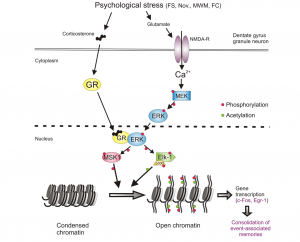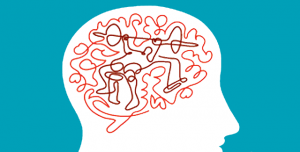Advancements in technology of today’s age is making it harder and harder to disconnect from the rest of the world. This inability to disconnect seems to be having a negative consequence on our overall health, especially our mental health. Our brains, in essence, are an evolved piece of hardware that was programmed to live in a world where real physical threats, such as lions and tigers and bears (Oh my!) – not a world where the biggest stressor is something someone said on a social media website. Since our brains are programmed to worry about evolutionary pressures that no longer exist, we are now left worrying over petty aspects of our lives’. This constant worry could be changing our genes that alter our memory and lead to memories that impact our everyday lives’.

If you wish to not get muddled by scientific jargon of this stress response and consolidation of memories, I suggest you bypass this next section and go to the basic 8 step mechanism.
Scientific Mechanism
When we encounter stress, our bodies release various molecules related to the stress (hormones called glucocorticoids and neurotransmitters such as glutamate. The glucocorticoids travel throughout the entire body; ultimately, reaching the part of the brain responsible for storing memories – the hippocampus. Within is the hippocampus is an area known as the dentate gyrus (DG), which plays a major role in the formation and storage of new memories1. Once the glucocorticoids reach the DG, they facilitate signaling of the ERK-MAPK signaling pathway1. This activation causes a cascade of events that leads to the activation of MSK1 and ELK-1, two nuclear kinases of the DG1. Activation of these nuclear kinases results in serine10 (S10) phosphorylation and lysine14 (K14) acetylation at histone H3 (H3S10p-K14ac)1. The phosphorylation and acetylation at this “mark” allows for the DNA, which is in the form of condensed chromatin, to be “opened” for transcription factors to act upon and alter the genes, such as Fos and Egr, for consolidation of memories1.
8 Simple Steps
Consolidation of memories can be boiled down to as simple as:
- Stress response releases messengers in the body (glucocorticoids)
- Messengers travel to the memory part of the brain (hippocampus)

- Messengers activate a receptor on neurons (glucocorticoid receptor)
- Receptor activation turns on a pathway (ERK-MAPK pathway)
- Pathway causes a cascade of events (MSK1 and ELK-1 activation)
- Ultimately, this cascade causes opening of DNA (H3S10p-K14ac marker)
- DNA is “read” leading to consolidation of memories (c-Fos and Egr-1 is transcribed)
- Consolidation of memories
Sometimes this response is so severe that is lasts and is reoccurring, often seen with individuals seen with PTSD.

https://www.everydayhealth.com/anxiety/anxiety-and-depression.aspx
How to reduce stress: Exercise!!!
If you are a college student like me, you are no stranger to stress. During finals, the levels of stress seem to weigh you down. Everyone deals with stress in their lives’. Some people seem to do just fine coping with stressors in their life, while others may struggle a little more. If you are one who tends to struggle with anxiety, try exercising! Studies have exhibited that exercise has a calming effect when someone becomes stressed. Exercise increased levels of GABA, the major inhibitor molecule, in the brain2. GABA calms the firing of neurons that causes the feeling of anxiety. A specific st udy showed that participants who exercised responded better to stress, increasing the levels of GABA as opposed to the participants who did not exercise3. Seek advice from a doctor if anxiety seems too much to bear. However, maybe the only prescription someone needs in order to feel less anxious is to exercise more! GABA levels increase with more exercise, diminishing the activity of neurons that lead to anxiety; thus, calming the hippocampus. Maybe, all you need to do is just sweat out the anxiety.
udy showed that participants who exercised responded better to stress, increasing the levels of GABA as opposed to the participants who did not exercise3. Seek advice from a doctor if anxiety seems too much to bear. However, maybe the only prescription someone needs in order to feel less anxious is to exercise more! GABA levels increase with more exercise, diminishing the activity of neurons that lead to anxiety; thus, calming the hippocampus. Maybe, all you need to do is just sweat out the anxiety.